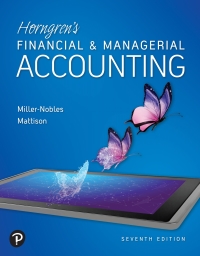Question
1. The process of alternative dispute resolution (ADR) includes: (Choose 3 answers.) negotiation. litigation. arbitration. mediation. 2. What must occur for an arbitrator's award in
1. The process of alternative dispute resolution (ADR) includes: (Choose 3 answers.)
negotiation.
litigation.
arbitration.
mediation.
2. What must occur for an arbitrator's award in alternative dispute resolution to be binding?
The arbitration must have been required by a court.
The parties to the dispute must agree on the arbitrator.
The parties to the dispute must have agreed to the arbitration and must have agreed that the arbitrator's decision will be final.
The arbitrator must be a licensed arbitrator.
3. An award obtained in an arbitration is appealable when: (Choose 2 answers.)
the arbitrator withdraws from the arbitration.
the arbitrator was partial.
the arbitration is nonbinding.
the arbitrator exceeded the arbitrator's powers.
4. What types of claims are well-suited to alternative dispute resolution (ADR)? Choose 2 answers.
claims involving an issue of law
claims involving divorce property settlement, child custody, and child visitation
any type of claim
small business liability claims
5. A court may strike down a mandatory arbitration clause in which of the following circumstances?
The clause attempts to bind a business in a foreign country.
The clause is fundamentally unfair or oppressive to one party.
The clause is in an employment contract.
The clause does not provide for the selection of an arbitrator.
6. A mandatory arbitration clause may be invalidated: (Choose 2 answers.)
if it is not in writing.
for any of the reasons that a contract is unenforceable.
if it is not covered by the Federal Arbitration Act (FAA).
if it is an online arbitration agreement.
7.When an appellate court decides to send a case back to the lower court for a decision on a particular issue, it is called:
a retrial.
a dismissal.
a remand.
an appellate review.
8. What is the term for an appellate court's decision to overturn the decision of the lower court and rule in favor of the person filing the appeal?
to vacate
to reverse
to remand
to deny
9.When an appellate court agrees with the lower court's decision, the appellate court:
affirms the lower court.
rules in favor of the appellant.
remands the case.
dismisses the appeal.
10. If an appellate court finds the lower court or jury incorrectly awarded an excessive amount of damages, the appellate court may:
affirm the case.
dismiss the case.
reverse the case.
modify the award.
11. The process of filing an appeal requires which of the following to be filed? Choose 3 answers.
a motion for appeal
the trial record and an abstract
a notice of appeal
an appellant's brief
12. A plaintiff seeking monetary damages from a defendant who does not respond to the lawsuit may file what motion with the court?
a motion for default judgment
a motion to dismiss
a motion for summary judgment
a motion for judgment on the pleadings
13. A motion that is made after all pleadings are filed, but before discovery, and which asks the judge to rule only on the information as presented in the pleadings is called:
a motion to dismiss.
a motion for judgment on the pleadings.
a motion for default judgment.
a motion for summary judgment.
14. When is a defendant's motion to dismiss typically filed?
after all pleadings are filed, but before discovery
when the defendant answers the lawsuit
before filing an answer to a complaint
when a defendant does not answer the lawsuit
15. What types of evidence may be obtained through the discovery process? Choose 3 answers.
testimony
a witness's attendance at trial
documents
admissions of a party
16. Which of the following actions are generally prohibited during the questioning of a witness at trial? Choose 3 answers.
challenging the credibility of the witness
asking the witness to describe statements they heard from a third party
questioning for the sole purpose of harassing, intimidating, or embarrassing the witness
solicitation of testimony that an attorney knows to be false
17. In a jury trial, the judge's role is to: (Choose 2 answers.)
provide instructions to the jury on legal issues.
make decisions on factual issues.
make decisions on legal issues.
provide instructions to the jury on the facts.
18. What is the jury's role in a trial? Choose 2 answers.
A jury must maintain confidentiality about the deliberations during and after a trial.
The jury must decide whether or not a case is proven based on the evidence and testimony admitted at the trial.
A jury must decide whether or not the evidence presented at trial was admissible.
The role of the jury is to be impartial during the trial and the deliberations.
19. The parties in a civil trial are: (Choose 3 answers.)
the plaintiff.
the defendant.
a prosecutor.
an intervenor.
Step by Step Solution
There are 3 Steps involved in it
Step: 1

Get Instant Access to Expert-Tailored Solutions
See step-by-step solutions with expert insights and AI powered tools for academic success
Step: 2

Step: 3

Ace Your Homework with AI
Get the answers you need in no time with our AI-driven, step-by-step assistance
Get Started


